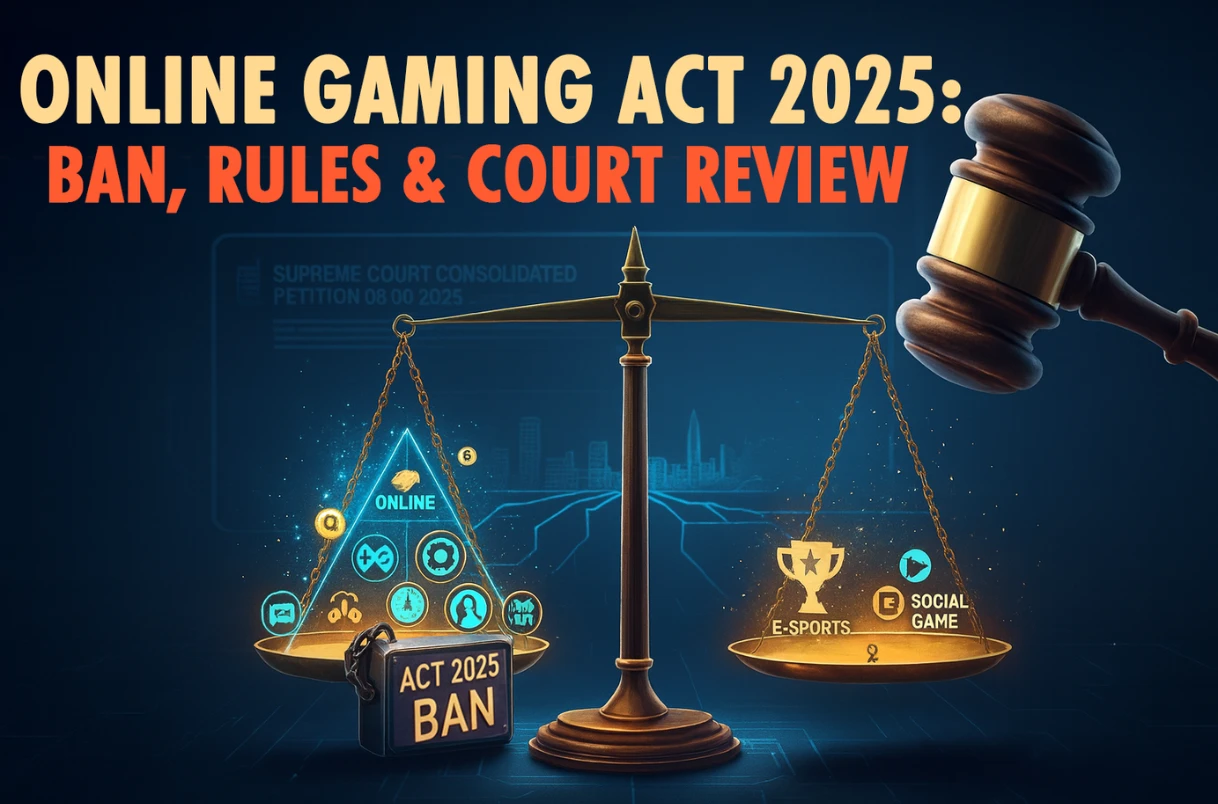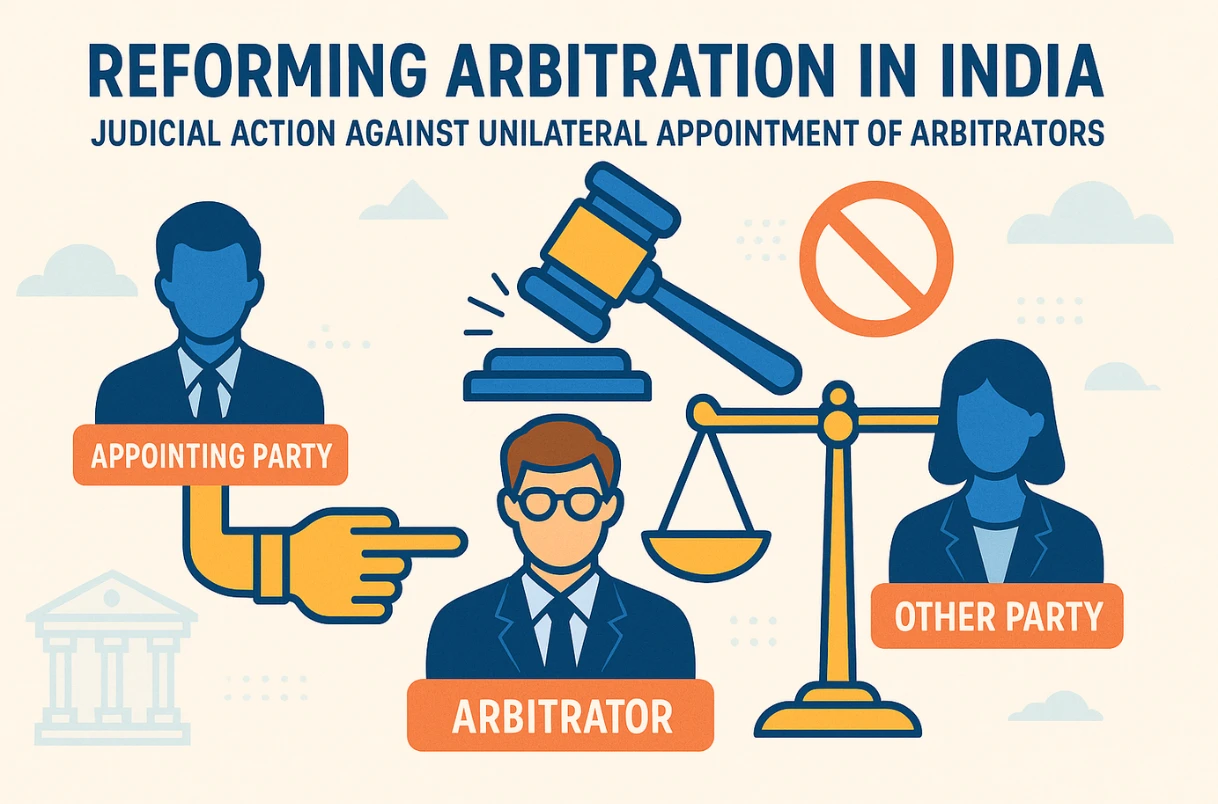Online Gaming Act 2025: Ban, Rules & Court Review

By – Aditya Pratap Singh and Devank Maheshwari
Table of Contents
This article examines the Promotion and Regulation of Online Gaming Act, 2025 (“the Act”) in light of recent judicial developments, most notably the Hon’ble Supreme Court’s online gaming petition order dated 08.09.2025 consolidating petitions pending before the Delhi, Karnataka, and Madhya Pradesh High Courts1. With the Act now under constitutional scrutiny, it is essential to analyse its scope, definitions, prohibitions, institutional framework, and enforcement provisions, and to understand why diverse stakeholders have challenged it.
Introduction and Background
The Act establishes a national framework for online gaming law. It promotes e-sports regulation in India by providing recognition and regulatory oversight, while simultaneously imposing a ban on online money games. The prohibition extends to both offering and participating in such games, rendering certain offences cognizable and non-bailable. As many platforms and participants previously considered these activities lawful, the ban raises significant questions concerning these stakeholders regarding the aspects of legal certainty, proportionality, and policy justification.
India’s online gaming sector has grown rapidly, encompassing competitive e-sports, casual and social games, and real-money platforms that allow users to stake money or monetary equivalents. In the absence of a coherent central framework, states adopted varied approaches: some imposed partial restrictions or prohibitions2, while courts attempted to define the boundary between games of skill and games of chance.3
Legislations such as the Information Technology Act, 2000 provided limited oversight and did not address sector-specific issues like in-game economies, offshore operators, addictive design elements, or systemic financial risks.4 These gaps motivated Parliament to enact a dedicated unified national law, resulting in the present Act, which is now poised for constitutional determination by the Supreme Court.
Objective of the Act
The preamble and legislative intent of the Act highlight three main public-interest goals: protecting vulnerable groups, especially youth and the economically weaker sections, from addiction and financial harm; safeguarding financial systems by preventing fraud, money laundering, and offshore evasion; and establishing a uniform national framework that encourages non-money formats such as e-sports and social games. These objectives are legitimate as policy aims. The core legal and policy question, however, is whether the chosen methods, particularly the blanket online gambling ban and wide investigatory powers are necessary and proportionate to achieve these ends.
Salient features of the Act
Definitions and Scope
The Act adopts broad, technology-neutral definitions. Most important is the definition of “online money game” which captures any online game where a user pays fees, stakes money, or uses items convertible to money in expectation of a monetary or other enrichment5. The phrase “other stakes” expressly includes virtual coins, credits, tokens or objects that are purchased or convertible into money6. By design, this definition applies irrespective of whether the game relies on skill, chance, or a mixture of both, and therefore brings many modern game mechanics within the statutory ban.
Blanket Prohibitions
Section 5 of the Act imposes a blanket prohibition on offering, facilitating or providing access to online money games and online money gaming services7. Complementing this, Section 6 restricts the advertising and promotion of online money games across all media, curbing the visibility and marketing that drive user participation. To ensure the prohibition is reinforced at the financial level, Section 7 bars banks and payment processors from authorizing transactions related to these games. Together, these provisions aim to sever both the demand side and the financial infrastructure that sustains real-money gaming platforms, creating an integrated regulatory blockade.
Regulatory Authority and Oversight
Further, the Act empowers the Central Government to constitute an Authority for online gaming regulation or to designate an existing agency, which may register e-sports and social games, decide whether a game falls within the banned category, issue directions, and handle grievances.
Penalties and Corporate Liability
It prescribes significant criminal penalties. In this regard, Section 9 sets out imprisonment and hefty fines for offering online money gaming services and for facilitating payments. Repeated convictions attract higher mandatory minimum terms and larger fines. Importantly, the Act extends liability to companies and to officers in charge of business units, unless they prove due diligence. Sections 10 and 11 make certain offences, cognizable and non-bailable and provide for corporate and officer-level accountability8.
Investigatory Powers
The Act empowers authorised officers to investigate alleged offences, block online content, and conduct searches and seizures, including in virtual spaces. They may override access controls and seize digital evidence. Section 14 allows blocking of services, while Section 16 provides arrest powers. These powers are broad and operate alongside other statutes, such as the Bharatiya Nagarik Suraksha Sanhita, 2023.
Promotion of E-Sports and Social Games
At the same time, the Act promotes e-sports and online social games. The Central Government and the Authority constituted under the Act can recognise and register such formats, support training and research, provide incentives, and run awareness campaigns.
Therefore, on a careful reading of the scheme of the Act, it is evident that it adopts a three-pronged approach: banning online money games through financial and criminal penalties, empowering authorities with wide enforcement powers, and promoting legitimate e-sports and social games through recognition, incentives, and responsible gaming measures.
Critical analysis
Despite its objective being focused at catering to the broader public interest, on a legal basis, the Act raises several legal problems and gaps that go on to raise apprehensions regarding its constitutionality and to foreseeable practical difficulties. These aspects have been highlighted below:
Federalism and Legislative Competence
First, the Act raises concerns of federalism, since betting and gambling have traditionally fallen within the jurisdiction of state legislatures under Entry 34 of List II (State List). By imposing a nationwide ban on activities that some states may prefer to regulate or permit, the central law directly conflicts with the legislative choices of states, potentially violating Article 246 regarding the distribution of legislative powers.
Skill vs. Chance Distinction Ignored
Second, the Act overlooks the well-settled judicial distinction between games of skill and games of chance. Constitutional Courts have repeatedly held that games where skill is the dominant element are not gambling and are protected as lawful economic activity9. By extending the prohibition regardless of the role of skill, the Act removes this safeguard and places at risk activities previously recognized as lawful, raising potential Article 19(1)(g) concerns regarding the right to carry on trade or business.
Overbroad and Vague Definitions
Third, the Act adopts definitions that are overly broad and technology-neutral, creating serious uncertainty. By including virtual goods, tokens, and ‘other stakes’ without a clear test for what qualifies as ‘convertible’ to money, the law risks bringing ordinary in-game features like microtransactions, cosmetic purchases, or battle passes under criminal scrutiny. Hybrid games that combine elements of skill and chance are especially vulnerable to arbitrary classification unless the Authority issues clear and objective criteria, further aggravating potential Article 19(1)(g) violations.
Privacy and Due Process Concerns
Fourth, the enforcement powers under the Act raise significant privacy concerns online gaming law and due process concerns. It authorizes searches, arrests, and access to personal devices without sufficient judicial safeguards. Constitutional principles and privacy jurisprudence require that such intrusive digital access be subject to strict safeguards and proportionality. As currently drafted, these powers may violate Article 21, which protects the right to life, personal liberty, and privacy.
Collateral Impact of Bans
Fifth, the Act relies on blunt tools like advertising bans and banking prohibitions, which carry major collateral effects. Advertising bans risk curbing lawful speech and legitimate sponsorships, while blocking banks and payment processors shifts the burden of enforcement to private institutions, disrupting settlements, refunds, and contractual obligations. These measures raise serious concerns of overreach, proportionality, and potential infringement of Article 19(1)(g).
Economic and Employment Consequences
Sixth, the law’s economic impact must be considered. The online gaming ecosystem supports professional players, coaches, event organisers, content creators and technology staff. Sudden prohibition threatens employment and investor confidence, causing potential market exit or offshoring. India risks losing innovation and talent if a balanced regulatory pathway is not adopted, highlighting further Article 19(1)(g) implications.
Risk of Underground and Offshore Gaming
Seventh, the risk of pushing activity underground is real. Global experience shows that blanket bans drive users to offshore platforms, VPN-based services, or unregulated channels that are harder to monitor and more prone to fraud, money-laundering, and other harms. A regulated domestic market with strong safeguards may control risks more effectively than outright prohibition, while still respecting Articles 19(1)(g) and 21.
Burden on Small Developers
Eighth, administrative and compliance burdens disproportionately affect smaller operators. Without clear criteria, tiered obligations, or transitional safeguards, small developers face high costs and legal uncertainty, leaving ongoing tournaments and prize commitments in limbo, which may also be challenged under Article 19(1)(g) as disproportionate restriction on trade or business.
Conclusion
The Promotion and Regulation of Online Gaming Act, 2025 aims to protect the public from addiction, fraud, and offshore operators. However, its broad prohibitions and wide executive powers raise constitutional issues of federalism, arbitrariness, and proportionality, while creating practical enforcement challenges. The move by the Supreme Court to transfer the pending petitions from various High Courts for constitutional scrutiny provides an opportunity for judicial clarity. A balanced legislative approach with cooperative federalism, clear classification, phased rollout, fair penalties, and strong privacy safeguards would better protect users and support legitimate operators in the digital gaming sector.
FAQs
-
What is the Promotion and Regulation of Online Gaming Act, 2025?
It is a central law that establishes a national framework for online gaming. It bans “online money games” through criminal and financial penalties, while promoting e-sports and social games through recognition, incentives, and oversight by a designated Authority.
-
Why does the Act ban online money games in India?
The ban is rooted in the Act’s stated goals of protecting vulnerable groups from addiction and financial harm, preventing fraud, money laundering, and offshore evasion, and ensuring uniformity across states that previously followed divergent approaches.
-
How does the Act affect e-sports and social gaming?
It creates a supportive regime by allowing the Government or the Authority to register such games, provide incentives, support training and research, and run awareness campaigns—framing them as legitimate, regulated alternatives to money-based formats.
-
What constitutional challenges has the Online Gaming Act 2025 faced?
Petitions argue that the Act intrudes into state legislative powers under Entry 34 (List II), disregards the judicially recognised distinction between skill and chance, imposes disproportionate restrictions on trade under Article 19(1)(g), and grants intrusive powers that may violate Article 21.
-
Does the Act distinguish between games of skill and games of chance?
No. Its definition of “online money game” includes all games involving monetary stakes or convertible virtual items, regardless of skill. This disregards the settled legal protection for skill-based games and effectively outlaws activities previously upheld by courts.
-
What enforcement powers are given under the Online Gaming Act 2025?
Authorised officers may override access controls, seize digital evidence, block services (Section 14), and arrest offenders (Section 16). Certain offences are cognizable and non-bailable. Companies and their officers also face liability unless they demonstrate due diligence.
-
How does the Act impact employment in India’s gaming industry?
The prohibition destabilises livelihoods of professional players, coaches, organisers, developers, and related workers. It undermines investor confidence, risks driving innovation offshore, and creates cascading economic consequences across the gaming ecosystem.
-
What privacy and digital rights concerns arise under the Act?
Its provisions allow searches, seizures, and access to personal devices without sufficient judicial safeguards. This raises concerns of proportionality, due process, and potential violations of Article 21’s guarantees of liberty and privacy in the digital sphere.
-
How do other countries regulate online gaming compared to India?
The European Union regulates online gaming through licensing, strict consumer protection rules, and anti-money laundering checks, while allowing skill-based and real-money formats under safeguards. The United States follows a fragmented model with state-level variations, ranging from permissive regimes to outright bans. By contrast, India’s 2025 Act adopts a uniform central ban on money games, a more restrictive approach than most global jurisdictions.
-
What reforms are suggested to balance regulation and innovation?
Experts suggest moving from prohibition to a calibrated framework: distinguishing skill from chance-based games, licensing operators, imposing strict KYC and financial monitoring, and ensuring privacy safeguards. A phased rollout, tiered obligations, and cooperative federalism could protect consumers while sustaining innovation, jobs, and investment in India’s gaming sector.
References –
- Union Of India v. Head Digital Works Private Limited And Anr, T.P.(C) No. 2484-2486/2025
- Nagaland Prohibition of Gambling and promotion and Regulation of Online Games of Skill Act; 2015 Sikkim Online Gaming (Regulation) Act, 2008 ; Telangana Gaming Act, 1974 and Telangana Gaming (Amendment) Act, 2017 ; Assam Gaming and Betting Act, 1970; The Odisha Prevention of Gambling Act, 1955.
- 2021 SCC OnLine Mad 2762 ; Order dated 29.08.2024 passed by Allahabad High Court in Writ Petition (C) No. 3880 of 2024.; 2017 SCC OnLine P&H 5372.
- Information Technology (Intermediary Guidelines and Digital Media Ethics Code) Amendment Rules, 2023.
- Section 2(1)(g) of the Promotion and Regulation of Online Gaming Act,2025.
- Section 2(1)(j) of the Promotion and Regulation of Online Gaming Act,2025.
- Section 5 of the Promotion and Regulation of Online Gaming Act,2025 provides that “No person shall offer, aid, abet, induce or otherwise indulge or engage in the offering of online money game and online money gaming service.”
- Section 10 of the Promotion and Regulation of Online Gaming Act,2025 provides that “Notwithstanding anything contained in the Bharatiya Nagarik Suraksha Sanhita, 2023, offences under section 5 and section 7 shall be cognizable and non-bailable.”
- R.M.D. Chamarbaugwala v. Union of India 1957 SCC Online SC 11 ; State of Andhra Pradesh v. K. Satyanarayana 1967 SCC Online SC 333 ; Junglee Games India Pvt. Ltd. v. State of Tamil Nadu 2021 SCC OnLine Mad 2762.


